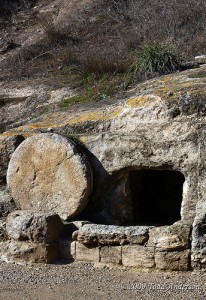
(Matt. 12:38-40)
Skeptics claim to have discovered an error in the New Testament —claiming Jesus was not in the tomb for three full 24-hour periods like he prophesied.
He was buried Friday afternoon and rose early Sunday morning.That seems to be only one full day and two nights.
Has the skeptic found an error in the Bible? How does one respond?
“For just as Jonah was three days and three nights in the belly of the sea monster, so will the Son of Man be three days and three nights in the heart of the earth”
(Matt. 12:38?40)
***************************************

It is clear that Jesus rejects the call to perform various signs before the Jewish leaders in order to justify his claims and actions. Jesus would not give them signs, however, for he did not come primarily to be a wonder-worker but a Savior. His miracles were performed to display his power and identity and out of mercy to help the poor and sick.
Jesus performed many miracles in private and with a warning not to tell others about them. Yet, one great miracle would be given as a definitive sign. This would be the “sign of Jonah,” his resurrection from the “heart of the earth.”
The main problem encountered in Matthew 12:38-40 involves the temporal designation “three days and three nights.” Interpreting this designation literally, some try to solve the “problem” by arguing that Jesus was really crucified on Thursday rather than Friday. A Friday crucifixion and a Sunday resurrection do not provide sufficient time for three days and three nights.

-
Save
There are numerous ways of figuring out the day-night scheme for this period of time, but it is clear that three separate days and nights cannot be obtained by a Friday crucifixion and Sunday resurrection scheme. Yet, it is clear from the Gospels that Jesus was crucified on Friday, the day of Preparation, that is, the day before the sabbath” (Mark 15:42) and raised on Sunday, the “first day of the week” (Mark 16:2). If the temporal designation of Matthew 12:40 is taken literally, a conflict does exist between the time indicated in this verse and the time indicated in the accounts of the passion story.
But should the expression “three days and three nights” be interpreted literally? Three arguments indicate that it should not.
First, it appears that this expression is another way of stating “on the third day” or “in three days.” This can be illustrated from 1 Samuel 30:12-13. The same Greek expression is found in 1 Samuel 30:12 in the Greek translation of the Old Testament (the Septuagint) as in Matthew 12:40.
Verse 13 refers to this three-day and three-night period as “three days ago” or, as the LXX literally states, “the third day today.” If “three days and three nights” can mean “on the third day,” there is no major problem in our passage.
By Jewish reckoning Jesus could have been crucified on Friday and raised on Sunday, the third day. Friday afternoon = day one; Friday 6 PM to Saturday 6 PM = day two; Saturday 6 PM to Sunday 6 PM = day three.’
A second argument against a literal temporal interpretation is the fact that Matthew did not see any conflict between this expression and either a third-day resurrection (Matt. 16:21; 17:23; 20:19) or a Friday crucifixion and Sunday resurrection scheme (Matt. 27:62; 28:1). For him, as well as for the other Evangelists, expressions such as “three days and three nights,” “after three days,” and “on the third day” could be used interchangeably.

-
Save
Finally, it should be pointed out that the main point of Jesus’ analogy in Matthew 12:40 does not involve the temporal designation but the sign of the resurrection. Only one miracle or sign will be given to this evil and adulterous generation. That sign will be Jesus’ resurrection from the dead. The temporal designation is much less significant. Perhaps Jesus refers to three days and three nights because this expression is found in the Old Testament passage which he wants to quote (Jonah 1:17).
Understood in the context of biblical Judaism—and knowing the idioms and figures of speech in the designation “three days and three nights”—there is no problem with the Friday crucifixion and Sunday resurrection scheme described in the passion narratives. Any Jew or Roman would have immediately understood; only those divorced from the historical context fail to understand.
It is only if a twentieth-century reckoning of time is imposed or if the idiomatic nature of this temporal designation is not understood in its context that a problem appears.
See also Dave Armstrong’s article “3 Days & Nights” in the Tomb: Contradiction?“



This Post Has 4 Comments
I guess the saying is true, “Great minds think alike.” I recently had a discussion with someone on that very thing. Here’s how it went:
Other Guy in bold:
Originally Posted by Eccl.12:13
If the day Christ died was in fact on a Thur. then Jesus lied! Let’s read again, how many hours Jesus tells us are in a day;
John 11
[9] Jesus answered, Are there not twelve hours in the day? If any man walk in the day, he stumbleth not, because he seeth the light of this world.
Now let’s read at what time of the day it was, on the day of Jesus death, that He was put into the tomb;
Matt.27
[57] When the even was come, there came a rich man of Arimathaea, named Joseph, who also himself was Jesus’ disciple:
[58] He went to Pilate, and begged the body of Jesus. Then Pilate commanded the body to be delivered.
[59] And when Joseph had taken the body, he wrapped it in a clean linen cloth,
[60] And laid it in his own new tomb, which he had hewn out in the rock: and he rolled a great stone to the door of the sepulchre, and departed.
Now let’s read how long Jesus said He would be in the grave;
Matt.12
[40] For as Jonas was three days and three nights in the whale’s belly; so shall the Son of man be three days and three nights in the heart of the earth.
So unless the rotation of the earth had changed, if there were 12 hours in a day there had to also be 12 hours in the night. And since Jesus Himself said He would be in the grave for 3 days AND 3 nights, combined that equals 72 hours; (3) periods of day at (12) hours each AND (3) periods of night at (12) hours each…..
My response:
That is where you stumble. Jesus didn’t say, “I’ll be in the heart of the earth for 36 daylight hours and 36 nightime hours. But simply for 3 days and 3 nights. And Jesus was speaking metaphorically. Because if Jonah was in the whale for 3 days and 3 nights, he therefore was raised on the FOURTH day.
Now Jesus was buried before sunset on Friday, that is one day and one night.
Jesus was in the ground for one 12 hour day and one 12 hour night
And then Jesus rose on the THIRD DAY. As it is written:
Acts 10:39-41
King James Version (KJV)
39And we are witnesses of all things which he did both in the land of the Jews, and in Jerusalem; whom they slew and hanged on a tree:
40Him God raised up the third day, and shewed him openly;
41Not to all the people, but unto witnesses chosen before God, even to us, who did eat and drink with him after he rose from the dead.
1 Corinthians 15:4
King James Version (KJV)
4And that he was buried, and that he rose again the third day according to the scriptures:
So which is it? Are you calling Jesus a liar? or are you calling the Holy Spirit which inspired the Scriptures a liar?
Because I believe both.
Sincerely,
De Maria
The only view that fits the biblical account is that Jesus was crucified on Wednesday and buried before 6:00 PM that day. The Jewish day began at 6:00 PM which was the Passover (Nisan “Aviv” 14). Therefore the Passover began on Wednesday after 6:00 PM which would actually be Thursday in the Julian calendar. The women brought the spices on Friday, rested on Saturday and went on Sunday morning after 6:00 AM and found the Lord was resurrected. This is the series of events and is accord with Jesus’ states of Matthew 12:38-40. Jesus was in the grave three full days and three nights. Any other view violates the biblical account and the historical facts.
STEVE RAY HERE: Seems you stand alone on this with your own novel and incorrect interpretation. But thanks for speculating here with us. God bless.
Dear Holy Bible is perfect. Jesus rightly gave the sign (only one) of Jonah as He said “in the heart of the earth.” Remember Jesus did not say either ‘in the tomb’ or ‘in the grave.’
Jesus was truly ‘in the heart of the earth’ that is Jesus was surrounded & covered by the evil doers, betrayers & sinners as not being open to the world being in the ‘Heart of the earth, no escape’. These all events right from the very thought of betrayal, hand over, arrest, scourging, suffering, passion, death on cross, burial and last rising from death, these all events happened as it is and was said.
Amen.
Happy Easter Steve!
Thanks for the link. I will return the favor. I just put up a new copious collection of scholarly defenses of the Resurrection, too:
https://www.patheos.com/blogs/davearmstrong/2020/04/jesus-resurrection-scholarly-defenses-of-its-historicity.html
STEVE RAY HERE: Dave, thanks so much for your massive list. Glad you could use my humble efforts. Keep up the good work my friend!
Comments are closed.